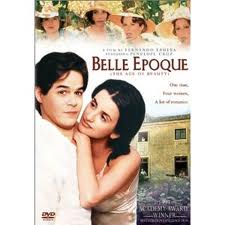 In Spain in 1931, there was a clash between the Republican Party that aimed to abolish the monarchy and establish a Spanish Republic, and the royalist Traditionalists that opposed them; this story is about Fernando, who volunteered for the Republican army but ends up deserting, and an artist who protects Fernando and lives in a village with his four lovely daughters.
In Spain in 1931, there was a clash between the Republican Party that aimed to abolish the monarchy and establish a Spanish Republic, and the royalist Traditionalists that opposed them; this story is about Fernando, who volunteered for the Republican army but ends up deserting, and an artist who protects Fernando and lives in a village with his four lovely daughters.
Fernando is a handsome young man, kind to women, pure-hearted, and excellent at cooking. The four daughters live in Madrid and only return to the village in the summer, but with Madrid in political turmoil, they suddenly return to the village, “tired of demonstrations.” Using beautiful images and music, wonderful humor, and smiles and family love, this movie depicts every day being a picturesque happy day—including the eldest, second, and third daughter each seducing Fernando in their own way; the third daughter being wooed by a young Traditionalist who serenades her under her balcony; having a lunch full of love with the Catholic priest who is a family friend; a carnival; an enjoyable picnic; and the mother who is an internationally successful opera singer suddenly returning home. The story ends with the victory of the Republican Party, the mother once more setting off on a world tour, the three elder sisters saying they will be back again next summer as they return to Madrid, and the youngest daughter marrying Fernando and the two leaving for America, “the land of opportunity,” to live happily ever after.
Such is the beautiful outer layer, but there is another layer hidden under the happy, humorous story.
This movie begins with a scene where Fernando, who deserted, is arrested by the Traditionalist military police. The military officers are a father and his son-in-law; the father says, “We should be kind to a Republican soldier since the Republicans may win,” and tries to let Fernando go. The angered son-in-law accidentally shoots and kills his father-in-law; the son-in-law, shaken by the sin of killing his beloved father-in-law, commits suicide in front of Fernando.
All four of the daughters are beautiful and charming. However, the eldest daughter’s husband drowned in a lake during a picnic last summer. The second daughter is a lesbian. The third daughter is confused about how to best handle her suitor, who is a Catholic from an affluent family and supports the royalists. The youngest daughter has strong feelings for Fernando, but everyone treats her like a child, so she is frustrated. When the mother thinks about the futures of her four daughters, she becomes worried. Regarding the eldest daughter, she is still as beautiful as ever, but every year she grows older, and it is hard to live as a widow. In terms of the second daughter, she has a professional job and economic stability, but will she be able to find a companion (either a man or a woman) who really loves her? The third daughter lives a transitory lifestyle, not having a job and not treating her suitor seriously. However, the mother doesn’t know if marrying that man will make the third daughter truly happy. The mother hopes the youngest daughter, who everyone treats like a child, will find a more stable life by learning from her older sisters. Even the mother has issues; although she believes she is an international opera singer, her performances are actually continuously in deficit, and the only reason she has barely kept her star status is because her lover/manager covers the financial burden from his own pocket.
Since the Republicans are winning, the third daughter’s suitor and her mother, who were stubborn royalists, quickly switch over to the Republican side. However, on the youngest daughter and Fernando’s wedding day, the Catholic priest who was a family friend hangs himself and dies. Even if Spain becomes a Republic, Fernando’s past of deserting the Republican army won’t disappear. So Fernando’s only option is to immigrate to America.
The family says, “I look forward to next summer!” and leaves, but will there really be a happy next year for them with Spain in political turmoil? Fernando and the youngest daughter who go to America together won’t be able to return to Spain for a while. Even though the mother is an opera singer, there is the possibility that she might end up dead by the roadside somewhere in South America if her manager abandons her. Anything could happen to the three daughters living in Madrid during this chaotic time, and there is the possibility that the elderly father, who is left all alone in the village, may get some illness and die tomorrow. However, the movie ends with hope that after a few years, this family may fondly look back on the short time that the deserter Fernando spent with this family, and say, “Those were beautiful times.”
The reality is that the Republic soon collapsed and Spain entered a civil war. After the Civil War, Franco’s dictatorship continued for a long time, and then after Franco’s death, the government suffered from instability. It was 1981 when Spain became truly stable as a democratic nation, while those who opposed Franco had to wait until 2008 for their honor to be restored. This movie was made in 1992, and it would have been difficult to make such a beautiful move without a stable political situation. However, even in 1992, direct criticism of fascism was probably not easy. This challenge resulted in this beautiful movie.
